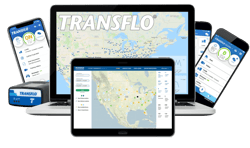How Technology Adoption Will Impact Freight Brokers This Hurricane Season
Carrier Relations | Agency Ownership | Business Advice | Logistics | Transportation | Best Practices | Agent Program | Freight Management | Shippers | Freight Broker
June 1st marked the beginning of hurricane season, and it could be an eventful six months, according to NOAA predictions. As of writing, there are already two named storms in the 2021 line-up. When it comes to natural disasters, the resounding message for freight brokers – and any transportation and logistics organization – is to prepare (now) for the worst and hope for the best.
Extreme weather events, like hurricanes, can be especially disastrous because they move slowly and cover vast areas. According to climate experts, they will only increase in frequency and severity, which means that disaster planning is essential – especially for industries like logistics. Freight brokers have witnessed the operational and financial fallout from natural disasters on businesses.

Roads and railways are often exposed to sustained winds and damaging debris during weather events, while flooding and power outages can bring operations to a standstill. The ripple effect throughout the supply chain can be equally devastating.
However, with technology adoption on the rise, freight brokers are increasingly well-positioned to leverage real-time data to mitigate supply chain disruption risks. This post will look at how freight agents can use technology to respond to unforeseen weather events quickly and effectively.
Technology Is Driving Our Post-Pandemic World
 Historically, every natural disaster – and recovery effort – has presented opportunities for learning and innovation. The COVID-19 pandemic appears to have created a catalyst for widespread technology adoption. Sometimes it takes a disaster to trigger new thinking. According to Eric Maskin, the Nobel prize winner for economics in 2007, “Necessity is the mother of invention. We are most innovative at times when we face the most difficult situations.”
Historically, every natural disaster – and recovery effort – has presented opportunities for learning and innovation. The COVID-19 pandemic appears to have created a catalyst for widespread technology adoption. Sometimes it takes a disaster to trigger new thinking. According to Eric Maskin, the Nobel prize winner for economics in 2007, “Necessity is the mother of invention. We are most innovative at times when we face the most difficult situations.”
Worldwide, small and mid-size businesses are rapidly replacing outdated technology with more robust digital tools to improve customer service and productivity. Organizations that fail to make these investments will risk experiencing a competitive disadvantage compared to their forward-looking peers.
In the logistics industry, leading freight brokerages are investing heavily in technology to increase visibility into operations, simplify processes, lower costs, and drive efficiencies while maximizing profits. It’s a fast-moving, complex, and competitive environment where it’s essential to stay relevant. The faster and more effectively a broker can respond to a customers’ changing demands, the more relevant they become.
Advanced Weather Forecasting Tools
 Weather forecasting is age-old, but forecasting accuracy is improving rapidly with the help of sophisticated applications. Better yet, these advanced technologies and predictive tools are increasingly available to consumers. Freight brokers, shippers, and carriers can leverage predictive data to navigate adverse weather conditions and minimize supply chain disruptions.
Weather forecasting is age-old, but forecasting accuracy is improving rapidly with the help of sophisticated applications. Better yet, these advanced technologies and predictive tools are increasingly available to consumers. Freight brokers, shippers, and carriers can leverage predictive data to navigate adverse weather conditions and minimize supply chain disruptions.
With hurricane season upon us, now is the time to ensure you’ve reviewed your freight plan for the coming months.
- Communicate with your customers about how freight rates might change in the event of a potentially crippling storm.
- Explain to customers how your organization can provide logistics services and contingency planning during weather-related events.
- Review potential capacity constraints with carriers and discuss how these might change amid adverse conditions.
- Educate your agents about best practices or processes that will help them provide better service to customers and carriers during an unforeseen event. At fast-growing brokerages, this may be the first year your employees or agents have to navigate a weather-related disaster.
Industry-Leading Transportation Management Systems
A robust transportation management system is essential to the success of any modern freight brokerage, especially when disaster strikes. Organizations that rely on pen-and-paper processes, including visiting numerous websites for critical information, are not well-suited to keep pace with customers’ evolving demands – and even less so during unplanned events.
During a hurricane, freight brokerages can leverage the features of a robust TMS to provide:
- Route contingency planning to assist with rerouting around closures and interruptions to primary routes.
- Real-time tracking and visibility on loads give shippers up-to-the-minute insight into the status of their freight and how unfolding events can impact the safe delivery of cargo.
- Enhanced capacity planning as trucks, trains, and air carriers shift away from danger zones.
- Real-time pricing and tendering account for the immediate and longer-term impact of fluctuating volume and higher variability associated with weather-related events.
- Multi-modal options to help decrease transport delays in the event typically used modes are incapacitated.
As technology advancements continue and become more common across the logistics industry, freight brokers, shippers, and carriers will ideally be able to conduct their operations – even those for unplanned events – from one system, decreasing logistics costs through enhanced efficiencies.
Third-Party Integrations to the Rescue
 While a robust TMS provides organizations with a solid base for managing freight operations, third-party integrations, applications, and managed services can provide additional value to freight brokers. Tracking applications like MacroPoint, Transflo, FourKites, and Project44, while highly beneficial during the regular course of business, can help brokers provide their customers with superior service during weather-related events.
While a robust TMS provides organizations with a solid base for managing freight operations, third-party integrations, applications, and managed services can provide additional value to freight brokers. Tracking applications like MacroPoint, Transflo, FourKites, and Project44, while highly beneficial during the regular course of business, can help brokers provide their customers with superior service during weather-related events.
Armstrong has experienced first-hand the value in keeping customers appraised of their cargo’s status during unanticipated events. Tracking and tracing trucks and freight is essential to managing customers’ expectations, especially when operations are anything but business-as-usual.
Want to Learn More?
Are there extra steps your organization should be taking to ensure your operations are as efficient as possible in the event of a hurricane or other disaster? To what extent could a ripple effect impact your business in the supply chain? Are you prepared to leverage up-to-the-minute data to make more informed business decisions?
At Armstrong, our mission is finding more ways to say ‘yes’ – even in the face of unexpected events or adversity. By investing heavily in technology, we find ways to become more proactive and adaptive to our customer’s needs and deliver more value than ever before.
If you’d like to learn more about how agents, carriers, and shippers benefit from our technology, connect with us today and schedule a demo! On our site, navigate to the Tech page and scroll down to complete our contact form.
About Rick Sammons
As Director of Technology, Rick oversees the software engineering, enterprise product management, IT systems, and operations functions. His team created and currently maintains our proprietary transportation management system, ATGFr8. Rick spent almost twenty years in the information technology field before joining Armstrong in 2016.



.jpg)
